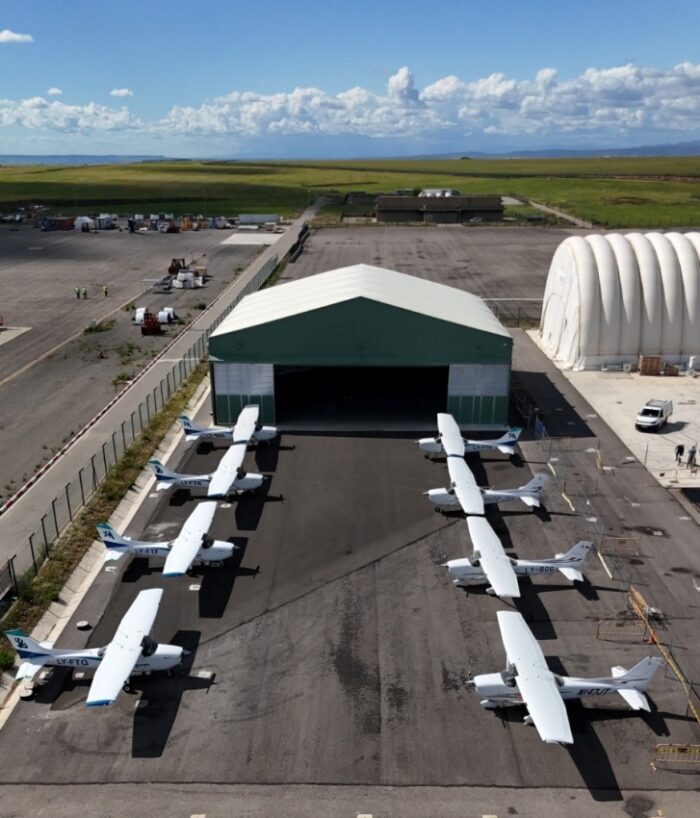This growth phase is an indication of India becoming a hub for world-class aviation training…
As the aviation industry undergoes significant transformation, the demand for skilled pilots is increasing reports indicates that India wil soon surpass the UK, becoming the third largest air passenger market globally. In this line, Vishal Kashyap, Managing Editor, Aviation World, interacted with Marijus Ravoitis, CEO, BAA Training, to discuss the company’s recent investments in expanding their infrastructure across Europe and their strategic plans for the Indian market. Excerpts…
As mentioned, India is your primary sector with 50 % slots reserved for them. Till now, how many pilots have enrolled with you, and under which program?
A: We have introduced an India-focused cadet training program, the Indian Cadet Program, which is specially designed to assist aspiring Indian pilots in achieving their dreams of becoming commercial pilots. This is the program that we are promoting in India because it responds to specific their home market needs. Currently, we have two batches of students enrolled in the program, which is a good indicator for the initial year.
BAA Training provides both pilot cadet programs as well as type ratings. One involves individual choice while the other involves airlines’ decisions. How does your team in India maintain the sync between both segments?
A: Our teams in India and Europe are interconnected and work collaboratively to ensure a smooth and efficient management process. This close cooperation allows us to tailor training experiences for individual cadets while aligning with the specific requirements of airlines for type ratings.
For cadet programs, we offer training that equips students with the skills and certifications they need to meet industry standards. We guide them in making informed career choices, ensuring they are well-prepared for the diverse opportunities in aviation.
For type rating courses, we partner with airlines to provide training tailored to their specific aircraft and operational needs. Our teams maintain strong communication with airline partners to ensure pilots are thoroughly trained to meet the highest standards.
Additionally, with training centers across Europe, we bring the expertise and resources of our global network to India, ensuring a consistent and world-class training experience. Our integrated approach allows us to seamlessly manage cadet and type rating training, meeting the needs of both individual pilots and the airlines they serve.
Two major airlines in India have their own training facilities now. Is it going to create the training sector more competitive?
The presence of multiple players, including established and new entrants, is beneficial for the industry as it fosters competition, encourages innovation, and ensures access to modern technology. This growth phase is an indication of India becoming a hub for world-class aviation training, which not only meets domestic demand but also serves the international market.

Tell us about the details of the BAA Training Facility in terms of its presence, number & type of aircraft for pilot training, and Type of simulators.
A: Our main facilities are set up across Europe, covering the full scope of pilot training. We have both Ground School and Simulator Center in Vilnius, Lithuania, which currently houses two Airbus A320ceo, one A320ceo-neo, one Boeing 737 NG, and one B737 CL full flight simulators, as well as other flight training devices.
Our Flight School, along with our second Ground School, is based at the Lleida-Alguaire International Airport, which creates an excellent setup for very realistic flight conditions because of the airport’s location. The airport is also close to other, larger ones, making it an ideal place to hone skills. We are also expanding our infrastructure there. We have bought additional 48 Cessna 172 Skyhawk aircraft, planned to be delivered by 2026, expanding our current 10 C172S’ fleet for initial flight training. We have also invested in our on-site, modern student accommodation, which is already under construction and expected to be completed in Q3 2025.
Spain is also home to our Simulator Center in Barcelona. It has two A320ceo/neo and one B737 MAX full flight simulators as well as other flight training devices, and we already have infrastructure expansion plans in sight there.
Next is our Paris Simulator Center in France, which has just recently expanded with a second A320neo full flight simulator, bringing the location’s simulator number to 5, along with two B737 NG and one B737-400 full flight simulators.Outside of Europe, our training center is in Ho Chi Minh City, Vietnam, catering to the Asia-Pacific region. It currently houses an A320ceo, one A320neo, and B737 NG full flight simulators.
Few globally renowned sim operators are doing big setup in India. And already three big ones have been operating for a long time. How do you see the sudden boom in this sector, which requires huge investment?
A: This sudden boom in India reflects the growing demand for advanced training solutions and the increasing emphasis on safety, efficiency, and skill development in aviation. India’s aviation sector is expanding rapidly, with rising passenger traffic and a greater need for trained pilots, which, naturally, has created demand for high-quality simulation facilities.
For globally-renowned simulator operators, India presents a strategic opportunity due to its developing aviation market, relatively lower operational costs, and the availability of a skilled workforce. While the sector does require significant investment, it also offers strong potential returns because of the long-term contracts and partnerships with airlines and aviation academies.
As mentioned previously, the competition, at this stage of aviation industry in India, brings more benefits that challenges by encouraging innovation, and ensuring access to modern technology.
Does BAA Training provide training for helicopter pilots as well as Business Aviation pilots?
A: Currently, our focus is set on commercial aviation, and we mainly provide pilot training for those, who aspire to become airline pilots.